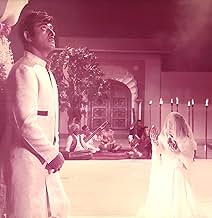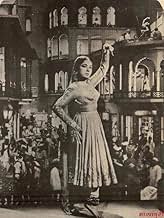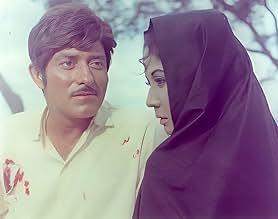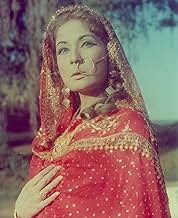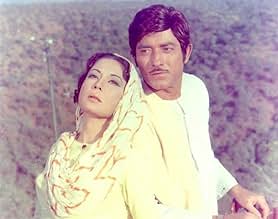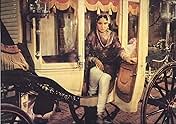AVALIAÇÃO DA IMDb
7,2/10
1,9 mil
SUA AVALIAÇÃO
Adicionar um enredo no seu idiomaIn Lucknow at the turn of the century, a dancer and courtesan believes that her pure soul and body will enable her to find true love and honor.In Lucknow at the turn of the century, a dancer and courtesan believes that her pure soul and body will enable her to find true love and honor.In Lucknow at the turn of the century, a dancer and courtesan believes that her pure soul and body will enable her to find true love and honor.
- Direção
- Roteiristas
- Artistas
- Prêmios
- 1 vitória e 4 indicações no total
D.K. Sapru
- Hakim Saab
- (as Sapru)
- Direção
- Roteiristas
- Elenco e equipe completos
- Produção, bilheteria e muito mais no IMDbPro
Avaliações em destaque
This movie is one among the very few Indian movies, that would never fade away with the passage of time, nor would its spell binding appeal ever diminish, even as the Indian cinema transforms into the abyss of artificially styled pop culture while drill oriented extras take to enhancing the P.T. styled film songs.
The cinematography speaks of the excellent skills of Josef Werching that accentuate the monumental and cinema scope effect of the film in its entirety.
Gone are the days of great cinema, when every scene had to be clipped many times and retakes taken before finalizing it, while meticulous attention was paid in crafting and editing the scenes. Some of its poignant scenes are filled with sublime emotional intensity, like the instance, when Meena Kumari refuses to say "YES" as an approval for Nikah (Marriage Bond) and climbs down the hill while running berserk in traumatized frenzy. At the moment, Raj Kumar follows her, and a strong gale of wind blew away the veil of Kumari and onto the legs of Kumar........
Kamal Amrohi shall always be remembered with golden words in the annals of Indian Cinema's history for endeavoring to complete this movie in a record setting 12 years. He had to manage filming of some of the vital songs without Meena's close ups, because Meena Kumari, the lady in the lead role was terminally ill and fighting for her life in early 1971.
The cinematography speaks of the excellent skills of Josef Werching that accentuate the monumental and cinema scope effect of the film in its entirety.
Gone are the days of great cinema, when every scene had to be clipped many times and retakes taken before finalizing it, while meticulous attention was paid in crafting and editing the scenes. Some of its poignant scenes are filled with sublime emotional intensity, like the instance, when Meena Kumari refuses to say "YES" as an approval for Nikah (Marriage Bond) and climbs down the hill while running berserk in traumatized frenzy. At the moment, Raj Kumar follows her, and a strong gale of wind blew away the veil of Kumari and onto the legs of Kumar........
Kamal Amrohi shall always be remembered with golden words in the annals of Indian Cinema's history for endeavoring to complete this movie in a record setting 12 years. He had to manage filming of some of the vital songs without Meena's close ups, because Meena Kumari, the lady in the lead role was terminally ill and fighting for her life in early 1971.
At last - I've finally got round to it and managed to see a "clean" copy of Pakeezah! Up until now I've only had a mangled scratchy jerky version taped off Dubai TV sometime in the '90's, with quirky English subtitles, dizzying widescreen coverage and a fluid colour with a mind of its own. Having thought the world of such a poor (and short) copy I find the decent one was well worth the wait and the full 140 minutes even more of a pleasure than I thought possible.
This was the lovely Meena Kumari's film from start to finish, and I believe was planned by her from 1958 on, finally realising it in 1971. What a shame it was that chronic alcoholism finally killed her soon afterwards, and in fact that she was too ill to perform in some of the scenes in Pakeezah, necessitating a body double. In some scenes the strain definitely shows in her face.
The story of Purity versus Adversity I can only treat as fiction having no experience of anything remotely close to it, but I'm led to understand that it faithfully depicts a world now gone that must have been common at one time in India. It's a sparkling and colourful film with a simple relentless epic message, an intense romantic tragedy which is somehow simultaneously feelgood too. But to me it's the peerless golden music by Ghulam Mohammed as sung by the incomparable Lata Mangeshkar - especially Thare Rahiyo - and its part in the unfolding of the story that makes this film so outstanding. I've seldom heard such serious, beautiful, poetic, wondrously sung and played songs on any movie soundtrack. Singin' In The Rain may be my favourite musical film but Pakeezah has my favourite music - yet Lata said that the songs themselves meant nothing special to her. The only pity is that the also unique Mohammed Rafi only had the one song in here, albeit a classic duet with Lata.
Because of all this but not blind to its faults, Pakeezah is my favourite Indian movie, filmed at a time when the Westernisation of India was gathering pace and watched now when Western values seem to be state sponsored and de rigueur. At the very least watch Pakeezah for a taste of what Indian "pop" music had to offer the world before it was all jettisoned for drum machines, the Bollywood Beat and bhangra.
This was the lovely Meena Kumari's film from start to finish, and I believe was planned by her from 1958 on, finally realising it in 1971. What a shame it was that chronic alcoholism finally killed her soon afterwards, and in fact that she was too ill to perform in some of the scenes in Pakeezah, necessitating a body double. In some scenes the strain definitely shows in her face.
The story of Purity versus Adversity I can only treat as fiction having no experience of anything remotely close to it, but I'm led to understand that it faithfully depicts a world now gone that must have been common at one time in India. It's a sparkling and colourful film with a simple relentless epic message, an intense romantic tragedy which is somehow simultaneously feelgood too. But to me it's the peerless golden music by Ghulam Mohammed as sung by the incomparable Lata Mangeshkar - especially Thare Rahiyo - and its part in the unfolding of the story that makes this film so outstanding. I've seldom heard such serious, beautiful, poetic, wondrously sung and played songs on any movie soundtrack. Singin' In The Rain may be my favourite musical film but Pakeezah has my favourite music - yet Lata said that the songs themselves meant nothing special to her. The only pity is that the also unique Mohammed Rafi only had the one song in here, albeit a classic duet with Lata.
Because of all this but not blind to its faults, Pakeezah is my favourite Indian movie, filmed at a time when the Westernisation of India was gathering pace and watched now when Western values seem to be state sponsored and de rigueur. At the very least watch Pakeezah for a taste of what Indian "pop" music had to offer the world before it was all jettisoned for drum machines, the Bollywood Beat and bhangra.
'Pakeezah' means pure. It's a spectacular movie written, directed and produced by Kamal Amrohi; starring Meena Kumari and Raaj Kumar. This movie perfectly portrayed the life, dream, expectations, disappointment, and wishes of 'Sahib Jaan', the leading character in the film played by Meena Kumari. Her dream gets stumbled with bitter reality, though the movie ultimately has a happy ending. This movie shows some spectacular dream sequences, as well.
This amazing movie with outstanding music and song lyrics will create magic in millions of classic movie fans for years after years. Songs were sung by singer Lata Mangeshkar, singer Mohd. Rafi and Mehdi Hassan.
Flawless acting and performances of Meena Kumari and Raaj Kumar and the other notable artists are truly memorable. Marvelous direction, music, cinematography. A really good piece of film by Kamal Amrohi. The song lyrics are truly mesmerizing and intriguing. Lyrics were written by Majrooh Sultanpuri, Kaifi Azmi, Kaif Bhopali & Kamal Amrohi.Some beautiful and memorable songs from the movie are 'Chalo dildar chalo', 'Chalte chale','Teer e nazar dekhenge', 'Mausam hain ashiana', Thaare rahiyo'. 'Inhi logo ne' is the most famous song from Pakeezah.
Music was composed by Ghulam Mohammed & Naushad Ali, Cinematography by Josef Wirsching, and the movie was edited by D.N. Pai. The sets where the movie was shot were beautiful designed by Kamal Amrohi himself. And the costumes were designed by multi-talented actress Meena Kumari herself.
This amazing movie with outstanding music and song lyrics will create magic in millions of classic movie fans for years after years. Songs were sung by singer Lata Mangeshkar, singer Mohd. Rafi and Mehdi Hassan.
Flawless acting and performances of Meena Kumari and Raaj Kumar and the other notable artists are truly memorable. Marvelous direction, music, cinematography. A really good piece of film by Kamal Amrohi. The song lyrics are truly mesmerizing and intriguing. Lyrics were written by Majrooh Sultanpuri, Kaifi Azmi, Kaif Bhopali & Kamal Amrohi.Some beautiful and memorable songs from the movie are 'Chalo dildar chalo', 'Chalte chale','Teer e nazar dekhenge', 'Mausam hain ashiana', Thaare rahiyo'. 'Inhi logo ne' is the most famous song from Pakeezah.
Music was composed by Ghulam Mohammed & Naushad Ali, Cinematography by Josef Wirsching, and the movie was edited by D.N. Pai. The sets where the movie was shot were beautiful designed by Kamal Amrohi himself. And the costumes were designed by multi-talented actress Meena Kumari herself.
10lance-20
Perhaps the most polished and accomplished of all Indian films - Pakeezah does not fall into any of the traps commonly associated with Bollywood film (ie tackiness, farce, wholesale and unsuccessful imitation of western film themes/genres). Pakeezah is indigenous to the Sub-Continent and authentic, almost Madam Butterfly-like in plot. Characters are well-developed, direction, although sometimes unrefined by today's standards, perceptive and convincing. The Urdu-speaking milieux at the time of Pakeezah were masters of understatement and how the dialogue conveys the subtleties of the age! The acting (particularly the 'looks' and the dynamic between characters) are a delight to behold although the nuances may be lost on contemporary viewers or those not acquainted with the mores and customs of Muslim India.
Coupled, with a captivating screenplay is a beautiful musical score, enhanced by the protagonist displaying eminent command of classical Indian dance (kathak). As is the case with most romantic tragedies, the heroine must die, but she does not take her leave of the audience without the viewer feeling he/she has been party to a truly memorable cinema experience. Pakeezah is surely the pinnacle of what Indian cinema has produced and is unlikely to be paralleled.
Coupled, with a captivating screenplay is a beautiful musical score, enhanced by the protagonist displaying eminent command of classical Indian dance (kathak). As is the case with most romantic tragedies, the heroine must die, but she does not take her leave of the audience without the viewer feeling he/she has been party to a truly memorable cinema experience. Pakeezah is surely the pinnacle of what Indian cinema has produced and is unlikely to be paralleled.
10lotus-9
This is definitely one of the best movies I've ever seen-- it has everything-- a genuinely touching screenplay, fine actors that make subtlety a beautiful art to watch, an actually elegant romance (it's a shame that that kind of romance just doesn't seem to exist anymore), lovely songs and lyrics (especially the final song), an artistic score, and costumes and sets that make you want to live in them. The ending was only a disappointment in that I was expecting a spectacular film to have a brilliant end-- but it was still more wonderful then the vast majority of movies out there. Definitely check this movie out-- over and over again. There are many details you miss the first time that deserve a second look.
Você sabia?
- CuriosidadesIt took 14 years for this film to be completed. To begin with, the film was launched in 1958, jointly planned by Kamal Amrohi and 'Meena Kumari'. It was launched in black-and-white, but when colour came in vogue, Amrohi scrapped those portions already shot and decided to start again. Later, Cinemascope came into vogue, and Amrohi acquired a Cinemascope lens from MGM and scrapped the plain colour portions too. Then Amrohi and Kumari separated in 1964, bringing filming to an indefinite halt. Finally, the film was resumed in 1968, and though by then Kumari was suffering from alcoholism and was in critical condition, she was still Amrohi's only choice and she agreed to complete the film.
- Citações
Salim Ahmed Khan: [in a note to Sahibjaan] Aapke paon dekhe, bahut haseen hai. / Inhe zameen par mat utariyega, maile ho jayenge.
[Saw your feet; they are very beautiful. / Don't place them on the ground, they will get dirty]
- ConexõesFeatured in Ek Number Ka Chor (1990)
Principais escolhas
Faça login para avaliar e ver a lista de recomendações personalizadas
- How long is Pakeezah?Fornecido pela Alexa
Detalhes
- Tempo de duração2 horas 27 minutos
- Proporção
- 2.35 : 1
Contribua para esta página
Sugerir uma alteração ou adicionar conteúdo ausente


